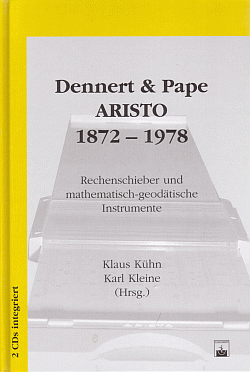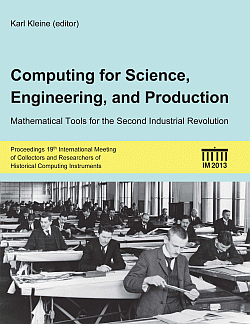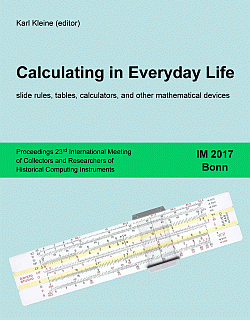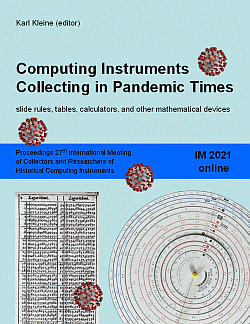| Prof. Karl Kleine | Publications |
|
Books about Slide Rules | ||||

|
Klaus Kühn & Karl Kleine (editors)
Dennert & Pape ARISTO 1872 - 1978
München: Zuckschwert-Verlag, 2004, isbn 3-88603-863-7 / 978-3-88603-863-3, xviii+439 pages, 2 CDROM
Unfortunately, this book is out of print.
I do however still have a number of copies, and you can
email me
to buy one of those.
flyer
(in German),
table of contents
| |||
|
I'm working on more books on slide rules, but it will still take a couple of years to complete them.
| ||||
|
Other Publications on the History of Scientific & Technical Computing
| |||
|
I have written some papers and presentations on the subject,
but these were mostly written in German.
So please look them up on the
German version of this page.
| |||
|
Publications on Computer Science
| ||||
| My publications on computer science suffer from the extreme speed of development of the discipline, so that they lost much of their significance and actuality for currrent systems. They are not that interesting any more for younger readers today. Furthermore, the most interesting reports I wrote were confidential research & development documents, not for publication. Therefore, I just offer a few publications on computer science here. | ||||
| From mid 1970s to early 80s I was part of the design team of the programming language ELAN developed at Berlin Technical University. The language was general purpose with strong support for teaching introductory courses in a modern way. There was special support for program development by stepwise refinement, data abstraction and modularity. As mini- and microcomputers became accessible and affordable both for schools of all kinds as well as for individual persons at that time, it was our goal to provide a programming tool much superior to BASIC, which then was the de-facto standard on this class of machines. Pascal was a contender, but ELAN was in a number of aspects both simpler and more supportive to beginners and it offered better facilities for larger and more complex programs. The key were its abstraction mechanisms for both the programming-in-the-small (refinement concept) and programming-in-the-large (module and data type concepts). | ||||

|
Karl Kleine, Stefan Jähnichen, Wilfried Koch,
Günter Hommel:
Program construction with abstract notions in ELAN in: Bob Lewis & Donovan Tagg (ed.), Computers in Education, proceedings of the IFIP TC-3 3rd World Conference on Computers in Education - WCCE81, Lausanne, july 1981, North-Holland Publishers, p.43-48 | |||

|
Günter Hommel, Joachim Jäckel,
Stefan Jähnichen, Karl Kleine,
Wilfried Koch, Kees Koster:
ELAN-Sprachbeschreibung Akademische Verlagsanstalt, Wiesbaden 1979  [book in German]
[book in German]
| |||
| After my time at Berlin Technical University I got a fellowship of the faculty of science at Nijmegen University in the Netherlands. There I participated in the preparation of a curriculum for a computer science programme and its implementation. At that time the idea of 'Software Engineering' was less than a decade old, but it was obvious that in future it would be a significant portion of the total programme. So I prepared a review of the state of the art and the available technology at that time in the form of a selected annotated bibliography. In retrospect it may still be useful for the study of the history of software development and the efforts to make it an engineering discipline. | ||||

|
Selected annotated bibliography on Software Engineering
Technical report, Faculty of Science, Nijmegen University, 1977 | |||

|
published in
ACM Software Engineering Notes, vol.3 no.1, 1978,
pp.18-25
https://dl.acm.org/doi/10.1145/1010734.1010736 | |||
| I do have a number of publications and other material from projects I ran or was an essential participant of, which I may prepare for publication here at some future time. But right now my interest is more in slide rules and other mathematical instruments, not with electronic computers. | ||||
|
Miscellaneous stuff / fun projects | ||||

|
MathCards
Katalog und Beschreibung, Design-Notizen, Lizensierung This is a fun project of mine with pretty postcards for the support of STEM disciplines, in particular mathematics and computer science. The message is simple: Mathematics is everywhere, it's not only useful, but has a beauty of its own. Note: Report in German. You might be interested just in the pictures, but you can also translate text fragments by cut&paste into any of the online translation services. See also my web page with samples! | |||

| home |


